First Olympic Challenge: the Beijing bubble
AFP's first advance team arrived in Beijing on January 11, to set up the agency's technical infrastructure to cover the Winter Olympics, from Feb 4-20. Without them not a single story, photo or video would ever reach clients. But before getting down to work in Beijing, Karim Menasria, François-Xavier Marit and Antonin Thuillier had to pass the first test for everyone coming for the Games: fulfil the ultra-strict requirements to enter the Covid-free 'bubble' put in place by Chinese authorities. And the test started weeks before they even arrived.
Beijing - “We've just landed in Beijing; it feels like we're on the moon .. a bit intimidating”. Day breaks on wintry Beijing, and François-Xavier Marit of AFP's chief-editor technical department in Paris, has just arrived with Karim Menasria, in charge of technical coordination and Antonin Thuillier, photographer assigned to the Redchef tech, which is agency jargon for the editor in charge of technical issues.
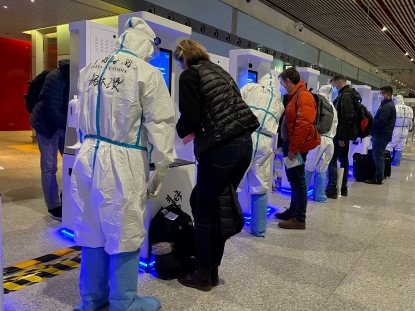 Passengers fill entry documents at their arrival at the Beijing International airport, on January 11, 2022 (François Xavier MARIT / AFP)
Passengers fill entry documents at their arrival at the Beijing International airport, on January 11, 2022 (François Xavier MARIT / AFP)
“A Boeing 777 for 50 people, just IOC (International Olympic Committee) members and a few journalists. Chinese welcoming committee in protective suits, disinfectant sprayed everywhere in an enormous airport where we are the only travellers” , writes Marit.
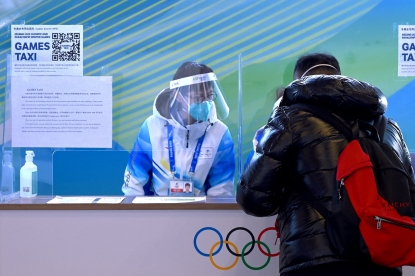 (AFP / Francois-Xavier Marit)
(AFP / Francois-Xavier Marit)
Here and there, ghost-like silhouettes encased in full-body suits nod with hooded heads, pointing the way to go through a maze of corridors gleaming under neon lights.
Amid this cold white landscape, where airport workers' faces disappear behind thick visors, travellers in coats and coloured puffy jackets seem to have landed from another planet. A single smile, pasted on the wall: belonging to the Beijing Games' mascot, little panda Bing Dwen Dwen.
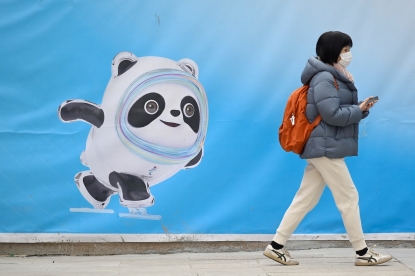 (AFP / Wang Zhao)
(AFP / Wang Zhao)
“New PCR tests; then we take the bus for our hotel .. Bus disinfected when we leave the airport, then escorted by two police cars,” says Marit in a message sent from the bus, plastered with a red logo, “Beijing 2022”.
AFP's Beijing bureau chief, Patrick Baert, welcomes the team's arrival in a mail with the words: “Good luck for the next tests.” Patrick Baert and the AFP Beijing bureau journalists know off by heart China's strategy since the first cases of Covid 19 were discovered on its territory in December 2019: a strict 'Zero Covid' policy, including sporadic lockdowns of entire districts or towns, contact tracing via mobile apps and repeated testing on a mass scale.
The approach has helped the world's second-largest economy keep new infections far lower than many other countries, but it is battling local outbreaks in several cities as well as in the Olympic bubble.
Beijing's tally of 20 new cases on Sunday was the city's highest since June 2020, according to the National Health Commission (NHC). City authorities have locked down some housing compounds, while officials in Fengtai district -- where most of Sunday's infections were detected -- have begun testing around 2 million people for the virus.
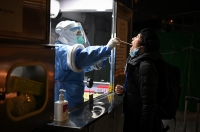
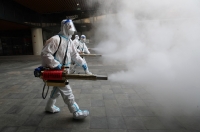
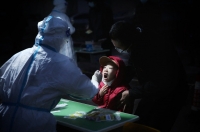
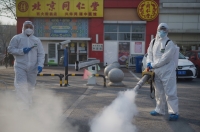
Since the start of the pandemic, the official Chinese toll stands at 4,377 dead and a little more than 100,000 confirmed. But concern is growing on the eve of the Olympics: new outbreaks have been reported in several Chinese towns. In Beijing a first case of the Omicron variant was detected less than three weeks before the start of the Games.
The AFP advance team, which arrived with 12 cases filled with transmission equipment, cameras and robotic devices, had to get to grips with Chinese Covid policy well before they got on the plane in Paris.
Where to start, on the long list of hygiene procedures to follow? A list aimed at keeping the Games Covid-19 free at a time when the hyper-contagious Omicron variant is raging through parts of the world, adding to the toll of a pandemic which has already killed nearly 5.6 million people.
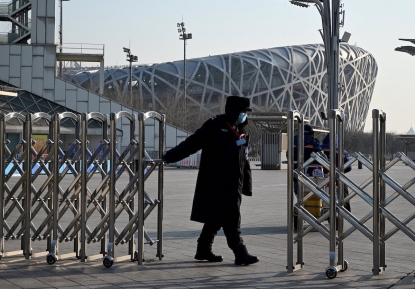 A security guard closes a gate into the Beijing Olympic Park on January 4, 2022 in Beijing, host to the 2022 Winter Olympic Games in one month's time on February 4. (AFP / Noel Celis)
A security guard closes a gate into the Beijing Olympic Park on January 4, 2022 in Beijing, host to the 2022 Winter Olympic Games in one month's time on February 4. (AFP / Noel Celis)
What about the press guidebook, called the “Media Playbook,” drawn up by the IOC and the Beijing Organising Committee for Olympic Games (BOCOG): 84 pages of rules, sent out a first time in November then updated in December after the discovery of Omicron in South Africa and its rapid spread into Europe and beyond.
“Beijing starts now for all of us. We must do everything to ensure that the Olympic dreams of athletes are not taken away just days before departure. The Playbooks are not just a rule book – they should now be a way of life,” IOC head Thomas Bach said on January 5.
A 'way of life' based on multiple tests before leaving for Beijing, arriving, during the Games but above all, the key to the whole system: as soon as you set foot in the airport you enter the secure bubble, also known as the Green Zone, like in a war zone, a sort of parallel world cut off from the outside, and from where you can't escape.
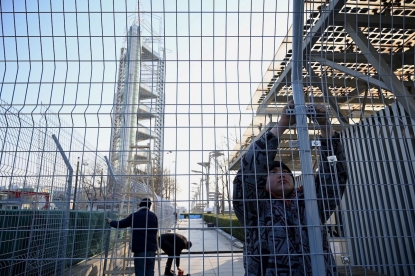 (AFP / Noel Celis)
(AFP / Noel Celis)
“Seek the support of mental health professionals if you wish to discuss the various experiences and emotions you may be feeling in the lead up to, during and after the Games”, says the IOC in a note ion his page giving additional guidance to those travelling to the games.
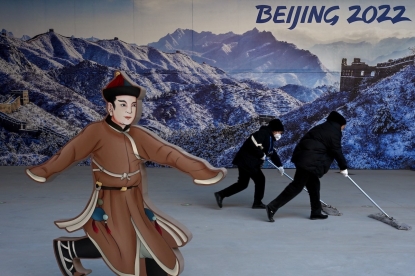 Workers clean near the press centre inside the bubble in Beijing on January 13, 2022, ahead of the Beijing 2022 Winter Olympic Games. (AFP / Francois-xavier Marit)
Workers clean near the press centre inside the bubble in Beijing on January 13, 2022, ahead of the Beijing 2022 Winter Olympic Games. (AFP / Francois-xavier Marit)
Before they left Paris, the AFP trio had had to: take their temperatures for 14 days, noting them on a dedicated app; be fully vaccinated (to avoid facing 21 days in quarantine on arrival); and take PCR tests 96 hours and 72 hours before departure at laboratories certified by the Chinese embassy in Paris (the results are sent direct to BOCOG).
They were also encouraged to take Covid 19 self-tests on days when they didn't take a PCR test; to limit their contacts with other people for two weeks before departure, and to avoid public or crowded spaces from five days before. An array of administrative documents to fill in, then, to board the aircraft, two QR codes: a “Green Health QR Code” and a “Customs Health Declaration QR Code”.
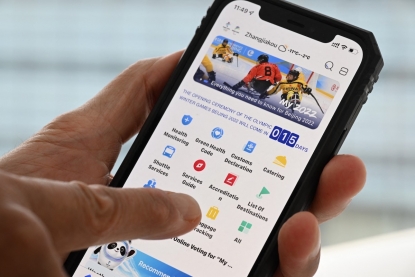 A user holds a mobile phone showing the Winter Olympic Games 2022 official app MY 2022 in Beijing on January 20, 2022. (AFP / Francois-Xavier Marit)
A user holds a mobile phone showing the Winter Olympic Games 2022 official app MY 2022 in Beijing on January 20, 2022. (AFP / Francois-Xavier Marit)
“I didn't go out after December 30,” says Menasria. “I did the shopping beforehand for New Year's Eve. I self-isolated during my holidays to avoid jeopardising preparations for the work trip. Getting it is a disaster!”
But on arrival in Beijing, despite his best efforts, catastrophe: Menasria was tested getting off the aircraft, along with all the passengers. He received the result on arrival at the hotel: positive. “They asked me who I was sitting next to on the plane; fortunately I was alone on the whole row of seats,” he says. He was immediately ordered to isolate in his room.
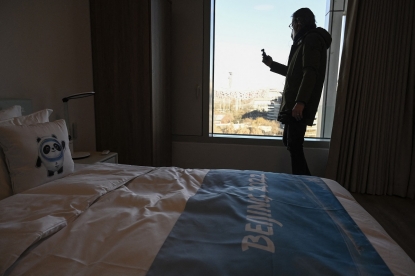 Room for athletes at the Beijing 2022 Winter Olympic Games village, on December 24, 2021. (AFP / Jade Gao)
Room for athletes at the Beijing 2022 Winter Olympic Games village, on December 24, 2021. (AFP / Jade Gao)
“I had a second test a few hours later, and it was negative. I think they were annoyed. .. Then I had a third test the following day, which was really difficult: when the assistant stuck the swab in, it felt like it was going right up into my skull. She was scraping, scraping, scraping for a long time.”
After three days of total isolation, on the 18th floor of the hotel reserved for people accredited for the Games, with a view over a motorway and sundry buildings, Menasria was declared negative and allowed to leave.
Well, leave .. “You can move within the bounds of what is permitted,” says Menasria. That meant basically, stay in the hotel. No popping out for a stroll, let alone heading into town. Everything is locked down.
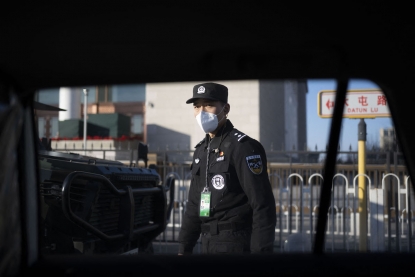 A member of Chinese security personnel walks near the Main Media Centre (MMC) in Beijing on January 27, 2022, ahead of the 2022 Beijing Winter Olympic Games. (AFP / Jewel Samad)
A member of Chinese security personnel walks near the Main Media Centre (MMC) in Beijing on January 27, 2022, ahead of the 2022 Beijing Winter Olympic Games. (AFP / Jewel Samad)
To head to the Olympic sites or the press centres, transport is only by dedicated shuttle vehicles. On trains, there is always a separate Olympic users' carriage. “It's really bizarre to be at an event where we see nothing,” says Menasria.
In the corridors of the hotel, as in the enormous press centres, cylindrical white robots wander round spraying disinfectant. Drawn on their front are eyes, a nose and a mouth -- covered by a mask, naturally -- giving them a strange animated air.
Chinese authorities implemented this unprecedented sanitary bubble, cut off from the rest of Beijing's 20-million population, at the start of January. The idea is that athletes, volunteers, cooks, drivers and media are kept in a "closed loop" to avoid any contact between them and ordinary Beijingers. Above all, no interaction, God forbid!
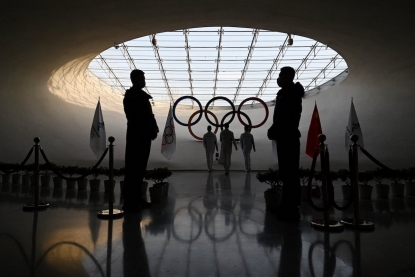 (AFP / Greg Baker)
(AFP / Greg Baker)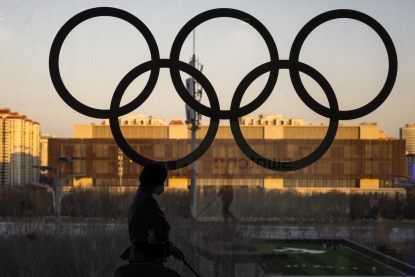 A worker sweeps the floor at the Main Media Centre (MMC) in Beijing on January 25, 2022, ahead of the Beijing 2022 Winter Olympic Games. (AFP / Jewel Samad)
A worker sweeps the floor at the Main Media Centre (MMC) in Beijing on January 25, 2022, ahead of the Beijing 2022 Winter Olympic Games. (AFP / Jewel Samad)
“In case of an accident involving an official Olympic Winter Games vehicle, please maintain a secure distance, to ensure your protection and avoid any contact with the vehicle and the people on board,” says a police warning.
As well as staying strictly within the limits of the bubble, our AFP trio -- and all the AFP journalists, photographers, and others joining them in the coming days -- have to continue taking their temperature daily, as well as a PCR test every day -- awaiting the result on tenterhooks. All results are sent to AFP's Covid liaison agent, who is in touch with the Chinese organisers.
Others haven't even made it this far. “We're on the second photographer who is no longer coming because he's positive. We have to find replacements and re-do all the paperwork!,” laments Thuillier.
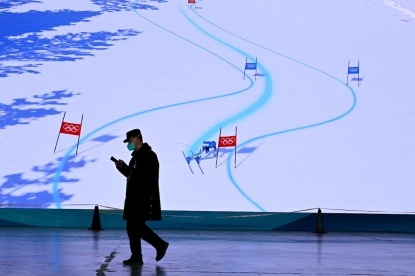 A security guard walks inside the "bubble" in Beijing on January 13, 2022 (AFP / Francois-Xavier Marit)
A security guard walks inside the "bubble" in Beijing on January 13, 2022 (AFP / Francois-Xavier Marit)
At last year's Tokyo summer Olympics -- Tokyo 2020, delayed until August 2021 due to the pandemic -- organisers asked participants to use dedicated shuttles to go to Olympic sites and not to leave their hotels, but didn't monitor them. Saliva tests were taken every two days.
“After 14 days, we were allowed to go out, eat at restaurants. We could even go to Mount Fuji!" recalls Menasria. The atmosphere wasn't exactly festive all the same: the Tokyo Games were held with virtually no spectators, while there was fierce criticism about the risk of super-spreading of the virus among the general population, due to contamination by participants.
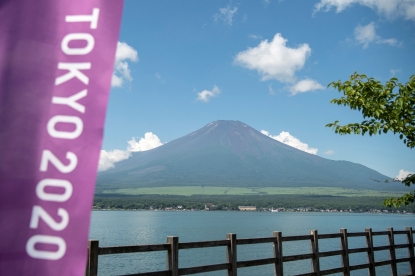 (AFP / Charly Triballeau)
(AFP / Charly Triballeau)
According to Japanese data released in December 2021, 33 people tested positive from the 11,300 athletes, and there were 464 positive cases among the tens of thousands of other accredited participants - although there was no evidence these cases spread into the general population, officials said.
If Beijing is copying some elements of Tokyo 2021's system, in coordination with the IOC, it has beefed them up considerably. “The Chinese authorities have deployed an impressive spiders' web," says Vincent Amalvy, AFP head of Special Operations.
“They've put in place hubs in agreement with all the airlines, so that aircraft are taken out of the market and designated to transport exclusively passengers heading to the Olympics. Their hub system is unprecedented!" he says. Because of this, the Beijing Olympic bubble starts as soon as you step on the plane.
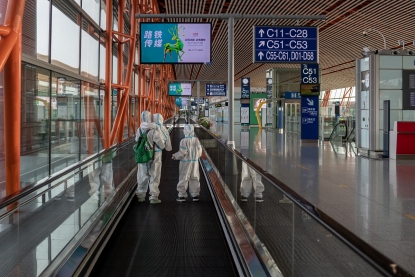 Passengers in full protective suits make their way to their gate at terminal three in Beijing's Capital International Airport which is nearly empty due to the COVID-19 coronavirus outbreak in Beijing on June 30, 2020. (AFP / Nicolas Asfouri)
Passengers in full protective suits make their way to their gate at terminal three in Beijing's Capital International Airport which is nearly empty due to the COVID-19 coronavirus outbreak in Beijing on June 30, 2020. (AFP / Nicolas Asfouri)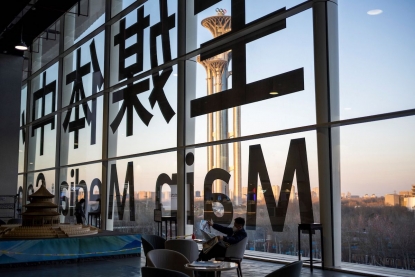 A man reads a newspaper in a lounge area at the Main Media Centre (MMC) in Beijing on January 25, 2022, ahead of the Beijing 2022 Winter Olympic Games (AFP / Jewel Samad)
A man reads a newspaper in a lounge area at the Main Media Centre (MMC) in Beijing on January 25, 2022, ahead of the Beijing 2022 Winter Olympic Games (AFP / Jewel Samad)
On the flipside: the eye-watering price of these flights chartered by China. "3,500 euros for Paris-Beijing, up to 7,500 euros for a trip from the US!” And for those on Air China: 2,000 euros for a suitcase in the hold.
“Travel costs have exploded our budget,” groans Amalvy. Bringing fewer journalists from the US and more from Europe and Asia has helped. In all AFP will have 80 people covering the Games, including 22 photographers.
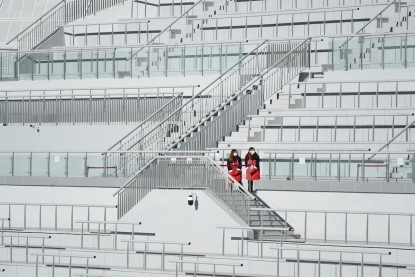 Two volunteers, at a test event in the National Ski Jumping Centre in Chongli county, Zhangjiakou city, China's Hebei province on December 3, 2021. (AFP / Wang Zhao)
Two volunteers, at a test event in the National Ski Jumping Centre in Chongli county, Zhangjiakou city, China's Hebei province on December 3, 2021. (AFP / Wang Zhao)
Chinese authorities stopped selling tickets to the public, after initially announcing that spectators, only Chinese residents, would be able to applaud the 3,000 or so athletes expected to perform.
Menasria is pained by the stark contrast between these Games and the 2008 summer Olympics in Beijing, on which he also worked. “In 2008 it was really great. The organisers listened to us; they tried to help and the sites were beautiful. We were even able to take photos on the roof of the stadium. Today it's not possible, with all these rules..”.
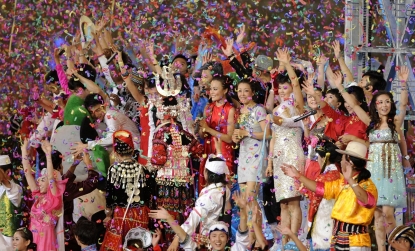 Entertainers perform during the closing ceremony for the 2008 Beijing Olympic Games at the National Stadium also know as the Bird's Nest on August 24, 2008. (AFP / Peter Parks)
Entertainers perform during the closing ceremony for the 2008 Beijing Olympic Games at the National Stadium also know as the Bird's Nest on August 24, 2008. (AFP / Peter Parks)
“Without interaction with the outside world, unfortunately we are waiting to finish our work and to head home. I know I've got a job to do, and I do it. Once you've understood that, there's no point in getting gloomy about it,” he says.
For Amalvy, all preparations in place, the logistics of the Games shouldn't pose a problem. What will be missing is “the idea of pleasure. Like in Tokyo.” But, on the horizon, there is hope: in two years' time Paris hosts the 2024 summer Olympics -- the “Renewal Games” if all goes well, he says.
By then the pandemic should -- fingers crossed -- be little more than a bad memory.
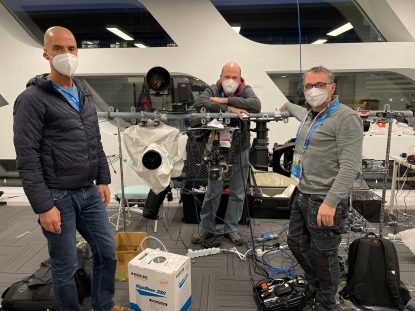 Karim Menasria, Antonin Thuillier and François-Xavier Marit in the press center, before the start of the Beijing Winter Olympics, on January 19, 2022
Karim Menasria, Antonin Thuillier and François-Xavier Marit in the press center, before the start of the Beijing Winter Olympics, on January 19, 2022
Interviews and writing by Béatrice Le Bohec in Paris. Translation by Michael Thurston.






